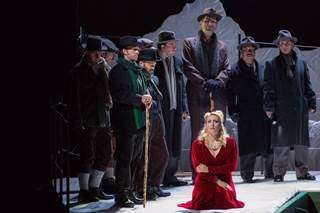|
Back
Tuscan Avalanche Lucca
Teatro del Giglio
01/19/2018 - & January 21*, 2018
Alfredo Catalani: La Wally
Serena Farnocchia (Wally), Zoran Todorovich (Giuseppe Hagenbach), Marcello Rosiello (Vincenzo Gellner), Francesco Facini (Stromminger), Paola Leoci (Walter), Irene Molinari (Afra), Graziano Dallavalle (Il Pedone di Schnals)
Coro del Festival Puccini, Elena Pierini (Chorus Master), Orchestra Filarmonica Pucciniana, Marco Balderi (Conductor)
Nicola Berloffa (Stage Director), Fabio Cherstich (Sets), Valeria Donata Bettella (Costumes), Marco Giusti (Lighting)

S. Farnocchia (© Alessia Santambrogio)
La Wally is the only opera by Alfredo Catalani (1854-1893) to have gained general recognition, thanks to the aria “Ebben? Ne andrò lontano,” rendered popular by Wilhelmenia Fernandez in Jean-Jacques Beineix’s 1981 film, Diva. Originally composed in 1878 by Alfredo Catalani as a separate piece, Chanson groenlandaise, this aria is the opera’s most melodious piece and its theme is used as a leitmotif several times throughout the opera. The opera was premiered in 1892, one year before the composer’s death, at La Scala, and it was performed shortly after in the same year his native Lucca, Tuscany. Lucca happens also to be Puccini’s hometown, which does not give Catalani much of a chance to shine in his birthplace. It is also probably the reason Lucca’s Teatro del Giglio has opted to produce La Wally. This neglected composer has more merit than most other verismo composers. Even his more obscure operas Loreley, Edmea and Dejanice deserve to be discovered. His brand of verismo, strong on rendering the settings real and less prone to Grand guignol violence, is more subtle than that of his contemporaries.
The work takes place in the Austrian Tirol, where Wally, daughter of wealthy Stomminger, has a soft spot for Hagenbach, who is the son of her father’s enemy. She is pursued by Gellner whom she does not love. Coerced by her father to marry Gellner, Wally prefers to leave her home, and hence the big aria “Ebben? Ne andrò lontano.” One year later, her father is dead and she is a rich heiress, envied by all. Hagenbach is engaged, but Wally seeks him out in the tavern. Arrogant Hagenbach makes a bet that he will be able to kiss proud Wally, and he wins. When Wally finds out, she finally accepts Gellner’s relentless marriage offer, but on condition that he kills Hagenbach. Pushed into the ravine, he is rescued by a remorseful Wally. In the final scene, Hagenbach comes to evacuate Wally from her mountaintop hideout, risking an avalanche, and reveals he’s always loved Wally. As he is looking for a way down, his call to Wally sets off an avalanche that carries him away. The desperate Wally leaps off the mountain to her death.
Simple but effective sets by Fabio Cherstich were used for the snow-covered Alpine outdoors. Zoran Todorovich is an impressive dramatic tenor with a ringing voice. He cannot be reproached for constantly singing forte and fortissimo, as this is how the role is written. His vocally expressed extroverted virility and his arrogant comportment on stage made him the unsympathetic anti-hero he’s meant to be. Though loud, he nonetheless expressed a range of emotions. He was most moving when he revealed his love to Wally in the dramatic final act. Baritone Marcello Rosiello has a somewhat dry voice, ideally suited for Wally’s jealous and frustrated suitor Gellner. The revelation of the evening was soprano Serena Farnocchia as Wally. It was a pleasant surprise to discover an artist with a substantial dramatic soprano voice and a temperament to go with it. She had no difficulty with the high notes in the opera’s main aria. Her ebullient temperament in the second act’s “Ei m’ingannò,” after she realizes Hagenbach’s passionate kiss was a mere bet for the benefit of the crowd at the tavern, was hair raising.
The character of Wally is interesting and the role offers an interesting challenge both vocally and dramatically. It’s best suited for an agile spinto with secure high notes and a strong stage presence. The Alpine setting and the demise of Hagenbach and Wally in an avalanche present a staging challenge. These factors undoubtedly prevent the opera from being regularly staged.
The smaller were roles were well executed. Paola Leoci, as the boy Walter, Wally’s only friend, was remarkably convincing as well as vocally excellent. The chorus, as the townsfolk in the Alpine Tirol village, plays an important part in this opera. They were commendably well-prepared by chorus master Elena Pierini. The avalanche scene disappointed, but gone are the days of Meyerbeer and grand opera’s elaborate stage effects. Wally, her back to the audience and with Tosca-like grace, simply leaps into a ravine. Though not theatrically memorable, Wally’s suicide was nonetheless effective thanks to Farnocchia’s intensity.
Ossama el Naggar
|